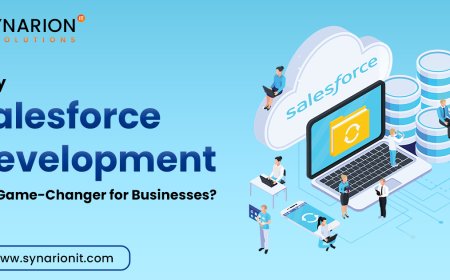A Comprehensive Guide to AI Consulting Firms: Strategies for Success
This guide delves into effective strategies for AI consulting firms, covering service diversification, client relationship management, and adopting innovative AI solutions to ensure sustained success in a competitive market.

Artificial Intelligence (AI) is no longer a futuristic conceptits a transformative force reshaping industries, from healthcare to finance to retail. But harnessing AIs potential requires more than just technology; it demands strategic vision, technical expertise, and seamless execution. This is where AI consulting firms step in, acting as navigators for businesses looking to integrate AI effectively. In 2025, the global AI consulting market is booming, valued at $8.8 billion in 2024 and projected to reach $73.01 billion by 2033, growing at a compound annual growth rate (CAGR) of 26.49%. This guide explores the role of AI consulting firms, their strategies for success, and how businesses can partner with them to thrive in an AI-driven world.
What Do AI Consulting Firms Do?
AI consulting firms are specialized partners that help businesses unlock AIs potential. They dont just build algorithms or deploy modelsthey align AI solutions with business goals, streamline operations, and ensure measurable outcomes. Their services typically include:
-
Strategy Formulation: Identifying high-impact AI use cases, assessing a companys readiness, and creating a roadmap for adoption.
-
Solution Design and Implementation: Building and deploying tailored AI solutions, such as machine learning models or generative AI tools.
-
Training and Capability Building: Equipping teams with the skills to use AI effectively through role-based training programs.
-
Risk Management and Governance: Ensuring ethical AI use, compliance with regulations, and robust risk mitigation strategies.
For example, firms like McKinsey & Company and BCG help clients integrate AI into core business processes, with McKinsey reporting that projects with personalized communication have an 18% higher success rate due to stakeholder engagement. These firms bridge the gap between ambition and execution, ensuring AI delivers tangible value.
Why Businesses Need AI Consulting Firms
The complexity of AI adoption can be daunting. According to Gartner, 70% of AI projects fail due to poor execution, misaligned strategies, or lack of in-house expertise. AI consulting firms address these challenges by offering:
-
Specialized Expertise: Consultants bring deep knowledge of AI technologies, from natural language processing to computer vision, tailored to specific industries.
-
Cost-Effective Solutions: By identifying high-ROI use cases, firms help businesses avoid costly trial-and-error approaches.
-
Faster Time to Market: With proven methodologies, consultants accelerate AI deployment, enabling businesses to stay competitive.
For instance, 80% of executives now see AI as critical to their strategy, yet 73% of firms lack AI readiness. Consulting firms like Accenture and PwC step in to assess data infrastructure, identify inefficiencies, and deliver solutions that drive 20% cost reductions or 15% revenue gains.
Key Strategies for AI Consulting Success in 2025
To deliver transformative results, AI consulting firms rely on a blend of strategic foresight, technical prowess, and human-centric approaches. Here are the top strategies shaping their success in 2025:
1. Aligning AI with Business Objectives
Successful AI consulting starts with understanding a clients goals. Firms conduct thorough assessments to pinpoint where AI can add the most valuewhether its optimizing supply chains, enhancing customer experiences, or improving decision-making. For example, BCGs Deploy, Reshape, Invent framework emphasizes aligning AI initiatives with long-term business transformation, boosting workforce productivity by 10-15% through off-the-shelf generative AI tools. By focusing on high-impact use cases, consultants ensure AI delivers measurable ROI.
2. Building Robust Data Infrastructure
AI thrives on data, but 73% of firms lack the data infrastructure needed for effective AI adoption. Top consulting firms like Deloitte and Cognizant prioritize comprehensive data integration, ensuring seamless connectivity between generative AI models and proprietary data. This enables real-time insights and operational efficiency, as seen in retail, where AI adoption for inventory management and demand forecasting rose by 38% in 2024.
3. Fostering a Culture of Trust and Adoption
AIs success depends on employee and customer trust. Firms like McKinsey implement comprehensive approaches to build trust, such as transparent communication about AIs role and mitigating inaccuracies. For example, McKinseys internal AI tool, Lilli, is used by 70% of its 45,000 employees, saving 30% of their time on tasks like research and data analysis. Consultants also develop role-based training to ensure employees at all levels can leverage AI tools effectively, reducing resistance and boosting adoption.
4. Embracing Hybrid Intelligence
The future of AI consulting lies in combining human expertise with AIs capabilities. McKinseys hybrid model pairs consultants strategic insights with AIs data-processing power, enabling rapid analysis of millions of records to identify market opportunities. This approach ensures AI complements human creativity rather than replacing it, delivering nuanced solutions that align with organizational culture.
5. Prioritizing Ethical AI and Governance
With increasing regulatory scrutiny, AI consulting firms are doubling down on ethical AI practices. Regulations like the EUs AI Act and GDPR demand transparency and accountability. Firms like PwC and EY integrate governance frameworks to ensure AI systems are fair, transparent, and compliant. For instance, 65% of enterprises now prioritize ethical AI, with consulting firms conducting bias audits and implementing explainable AI models to build trust. These efforts mitigate risks like data breaches or biased outcomes, which could cost companies millions in fines or reputational damage.
6. Leveraging Industry-Specific Expertise
AI consulting firms tailor solutions to specific industries, recognizing that a one-size-fits-all approach doesnt work. In healthcare, firms like Accenture use AI to improve diagnostics, with 62% of healthcare providers reporting better patient outcomes through AI-driven insights. In finance, Deloittes AI solutions enhance fraud detection, reducing false positives by 25%. By understanding industry nuances, consultants deliver solutions that resonate with unique challenges and opportunities.
7. Scaling with Agile Methodologies
Agile methodologies are critical for scaling AI solutions. Firms like Infosys adopt iterative approaches, testing AI prototypes in controlled environments before full-scale deployment. This minimizes risks and allows for rapid adjustments. For example, agile AI projects in manufacturing have reduced deployment times by 30%, enabling faster realization of benefits like predictive maintenance or quality control.
Choosing the Right AI Consulting Firm
Selecting the right AI consulting partner is crucial. Here are key factors to consider:
-
Proven Track Record: Look for firms with case studies demonstrating success in your industry. For example, BCGs work with a global retailer increased customer retention by 12% through AI-driven personalization.
-
Scalable Solutions: Ensure the firm offers solutions that can grow with your business, from pilot projects to enterprise-wide deployments.
-
Cultural Fit: Choose a firm that aligns with your organizations values, especially on ethical AI and employee engagement.
-
End-to-End Capabilities: Opt for firms that provide comprehensive services, from strategy to implementation to training.
According to a 2024 IDC survey, 85% of companies that partnered with top-tier AI consulting firms reported faster ROI compared to in-house efforts. Firms like McKinsey, Accenture, and Deloitte consistently rank high for their ability to deliver measurable outcomes.
The Future of AI Consulting
The AI consulting landscape is evolving rapidly. By 2026, 90% of enterprises are expected to leverage AI for competitive advantage, driving demand for consulting services. Emerging trends include:
-
Generative AI Expansion: Consulting firms are increasingly integrating generative AI for content creation, customer service, and product design, with 55% of firms adopting these tools in 2024.
-
Sustainability Focus: AI consultants are helping businesses use AI for sustainability, such as optimizing energy use, with 40% of firms reporting reduced carbon footprints.
-
Human-AI Collaboration: The rise of augmented intelligence will see consultants blending AI with human insights to drive innovation.
Conclusion
AI consulting firms are pivotal in helping businesses navigate the complexities of AI adoption. By aligning AI with business goals, building robust data systems, fostering trust, and prioritizing ethics, these firms unlock transformative value. With the AI consulting market set to grow exponentially, partnering with the right firm can make the difference between success and stagnation. Whether youre a small business exploring AI or a global enterprise scaling solutions, the strategies outlined in this guidebacked by industry expertise and real-world statscan help you thrive in an AI-driven future.







































